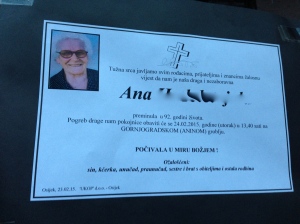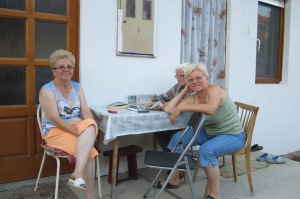The red candle flickered outside on the table; a small but bright light probing the darkness—and so I knew it was finally over.
I had been gone all weekend for a women’s retreat, and I returned just 20 minutes after Baka (grandmother) passed away.
At a loss, I wasn’t sure of the cultural expectations. Should I run over to R.’s house and offer my condolences right away? What were the “grieving rules” in this culture?
But they had just taken away the body so I decided to wait. I texted the other “Golden Girl” as I fondly call these two women who live next to each other, sharing [at least] two coffees a day—and anything else that happens to come up.
“Can I do anything?” I wrote.
“Come over to my house, ” was V.’s response. I dropped my weekend bag and headed over.
When I got there, she was in a flurry of baking, pulling flour, eggs, nuts from the cupboards, looking dazed and on autopilot. I thought she wanted me to help prepare the cakes for the torrent of guests who would begin arriving the next morning, but she had only one job for me.
“Just sit awhile and be with me,” she said. Soon, her daughter came to help with the cakes—my guess is that I am not thought to be proficient enough to be of real service in the baking department. I felt so useless sitting there, but I reminded myself that this “being” is a high value in this culture. With that in mind, I decided to welcome the feeling of uselessness, an uncomfortable resistance to my culture’s demand for performance and production.
The next morning, after receiving some “cultural advice” from a couple of friends, I headed across the garden to R.’s house. When she saw me, her face crumpled and she grabbed me, hugging me fiercely and kissing my cheek.
“She went in peace,” she choked out, “she went in peace.” I could see, with her apron on and her baking dishes all over the counter, that she was also preparing food for the next couple of days, so I did not stay long.
Later, I took over some banana bread. “Why?” she demanded, at first refusing my offer. Then her face crumpled again. “Thank you,” she said simply and ran back inside before her tears got out of control.
The next day was the funeral, but in the morning, V. saw me coming out of my house. “Come over for coffee with R. and myself….there is no one here right now!” It was brief window for a quiet coffee with just myself and the Golden Girls without the constant stream of guests.
The room seemed so empty without Baka in her bed—gone was the potent suffering that had hovered over the room. Instead, there was a new emptiness, but also—release.
A release from suffering into death—which is actually new life. But still, grieving is exhausting and long—it ebbs and flows and flows and ebbs as one slowly adjusts to a new normal.
Later, everyone met outside at the graveyard. The priest conducted a short
service, and then we walked in procession to the actual burial place where the priest said another prayer. The entire event took only 20 minutes. I was surprised to see our whole little neighborhood there—representatives from each household taking part in the brief service.
Afterward, back at the house, R. insisted I join them for lunch. I was seated at one of the groaning tables of food and introduced as “Melody from Oregon who is dear to us.”
“Do you have sheriffs there?” One older man asked me.
“And cowboys?” His wife chimed in, smiling mischievously.
“That’s in Texas,” I informed them gravely.
The guests began to trickle out slowly. I knew the hard part was coming for R.—she had lost her mother, and the distractions and busyness of hosting so many guests temporarily blunts that reality. Soon, she will pack up and move back to Belgrade, Serbia, where her twin sons and grandsons live. I know this is the desire of her heart, but there will be a big hole in mine when she moves.
After a death, not only do you grieve the loss, but also the inevitable changes that come in its wake.
Certainly, the rites of death have different cultural rules—but grief is a shared language.



